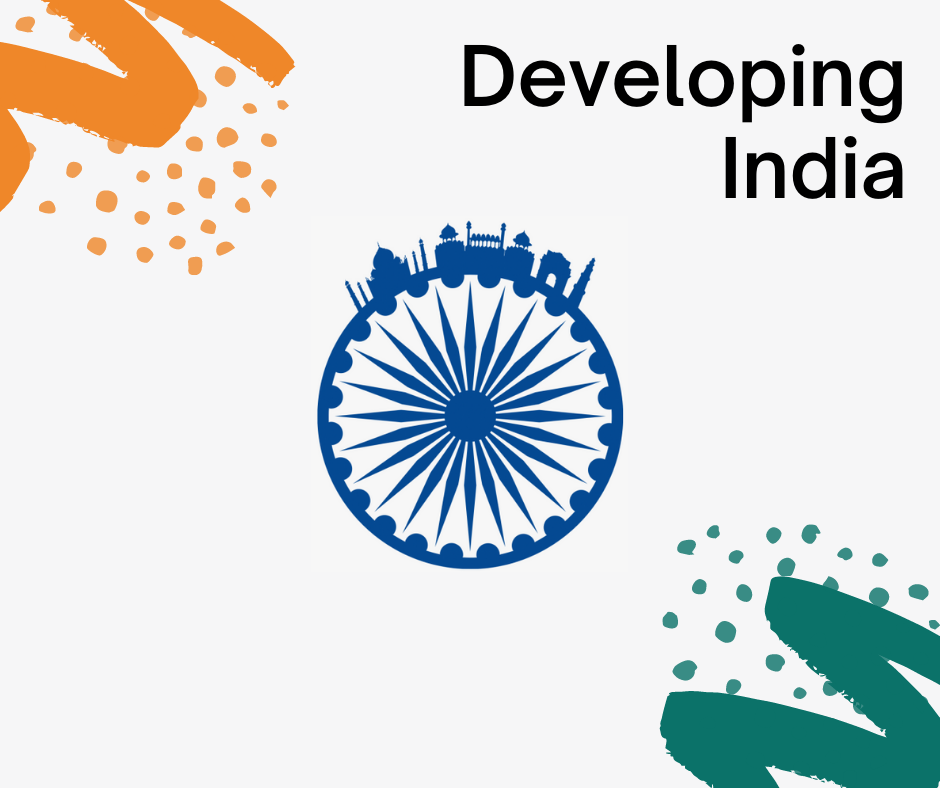Developing India
- Home
- TheMatic Areas
- Developing India

Aatmanirbhar Bharat Abhiyaan support Indian economy in fight against COVID-19
(Source - https://www.india.gov.in/spotlight/building-atmanirbhar-bharat-overcoming-covid-19)
India has faced the COVID-19 situation with fortitude and a spirit of self-reliance, that is evident in the fact that from zero production of Personal Protection Equipment (PPE) before March 2020, India today has created a capacity of producing 2 lakh PPE kits daily, which is also growing steadily.
Additionally, India has demonstrated how it rises up to challenges and uncovers opportunities therein, as manifested in the re-purposing of various automobile sector industries to collaborate in the making of life-saving ventilators. The clarion call given by the Hon'ble PM to use these trying times to become Atmanirbhar (self-reliant) has been very well received to enable the resurgence of the Indian economy.
The Five Pillars of Atmanirbhar Bharat focuses on:
- Economy
- Infrastructure
- System
- Vibrant Demography and
- Demand
The Five Phases of Atmanirbhar Bharat are:
- Phase-I: Businesses including MSMEs
- Phase-II: Poor, including migrants and farmers
- Phase-III: Agriculture
- Phase-IV: New Horizons of Growth
- Phase-V: Government Reforms and Enablers
Aspirational Districts Programme by NITI Aayog
(Source. - https://niti.gov.in/about-aspirational-districts-programme)
Launched by the Hon’ble PM in January, the ‘Transformation of Aspirational Districts’ programme aims to quickly and effectively transform these districts. The broad contours of the programme are Convergence (of Central & State Schemes), Collaboration (of Central, State level ‘Prabhari’ Officers & District Collectors), and Competition among districts driven by a mass Movement. With States as the main drivers, this program will focus on the strength of each district, identify low-hanging fruits for immediate improvement, measure progress, and rank districts.
The Government is committed to raising the living standards of its citizens and ensuring inclusive growth for all – “Sabka Saath Sabka Vikas”. To enable optimum utilization of their potential, this program focusses closely on improving people’s ability to participate fully in the burgeoning economy. Health & Nutrition, Education, Agriculture & Water Resources, Financial Inclusion & Skill Development, and Basic Infrastructure are this programme’s core areas of focus. After several rounds of consultations with various stakeholders, 49 key performance indicators have been chosen to measure progress of the districts. Districts are prodded and encouraged to first catch-up with the best district within their state, and subsequently aspire to become one of the best in the country, by competing with, and learning from others in the spirit of competitive & cooperative federalism.
NITI Aayog in partnership with the Government of Andhra Pradesh has created a dashboard for monitoring the real-time progress of the districts. District Information Officers underwent training on March 23, 2018 on how to enter data to the dashboard and generate MIS (Management Information System) reports. On April 1, 2018 districts will start entering data. Beginning May 2018, districts will be ranked based on progress made (‘delta ranking’) on a real-time basis. The dashboard will be open to the public to monitor the progress of the aspirational districts.
Download - Aspirational Districts - Unlocking Potentials
Download - DEEP DIVE - Insights from Champions of Change The Aspirational Districts Dashboard
Download - Transformation of Aspirational Districts - Primer - A New India 2022
Download - Transformation of Aspirational Districts - Primer - A New India 2022 - Hindi
Download - Aspirational Districts Baseline Ranking, March 2018
National Skill Development Mission
(Source - https://www.msde.gov.in/nationalskillmission.html)
The National Skill Development Mission was approved by the Union Cabinet on 01.07.2015, and officially launched by the Hon’ble Prime Minister on 15.07.2015 on the occasion of World Youth Skills Day. The Mission has been developed to create convergence across sectors and States in terms of skill training activities. Further, to achieve the vision of ‘Skilled India’, the National Skill Development Mission would not only consolidate and coordinate skilling efforts, but also expedite decision making across sectors to achieve skilling at scale with speed and standards. It will be implemented through a streamlined institutional mechanism driven by Ministry of Skill Development and Entrepreneurship (MSDE). Key institutional mechanisms for achieving the objectives of the Mission have been divided into three tiers, which will consist of a Governing Council for policy guidance at apex level, a Steering Committee and a Mission Directorate (along with an Executive Committee) as the executive arm of the Mission. Mission Directorate will be supported by three other institutions: National Skill Development Agency (NSDA), National Skill Development Corporation (NSDC), and Directorate General of Training (DGT) – all of which will have horizontal linkages with Mission Directorate to facilitate smooth functioning of the national institutional mechanism. Seven sub-missions have been proposed initially to act as building blocks for achieving overall objectives of the Mission. They are:
(i) Institutional Training, (ii) Infrastructure, (iii) Convergence, (iv) Trainers, (v) Overseas Employment, (vi) Sustainable Livelihoods, (vii) Leveraging Public Infrastructure.
Ministry of Skill Development and Entrepreneurship (Government of India)
Swachh Bharat Mission
(Source - https://swachhbharatmission.gov.in/sbmcms/index.htm)
To accelerate the efforts to achieve universal sanitation coverage and to put the focus on sanitation, the Prime Minister of India had launched the Swachh Bharat Mission on 2nd October 2014. Under the mission, all villages, Gram Panchayats, Districts, States and Union Territories in India declared themselves "open-defecation free" (ODF) by 2 October 2019, the 150th birth anniversary of Mahatma Gandhi, by constructing over 100 million toilets in rural India. To ensure that the open defecation free behaviours are sustained, no one is left behind, and that solid and liquid waste management facilities are accessible, the Mission is moving towards the next Phase II of SBMG i.e. ODF-Plus. ODF Plus activities under Phase II of Swachh Bharat Mission (Grameen) will reinforce ODF behaviours and focus on providing interventions for the safe management of solid and liquid waste in villages.
Third Planet Foundation activities and interventions are aligned with Ministry of Corporate Affairs (MCA) guidelines and Sustainable Development Goals (SDG).
Contact Us at info@3planet.org for more information and collaboration.
You can also connect with us at: 011 – 4168 5208 | 91 – 98113 42299
